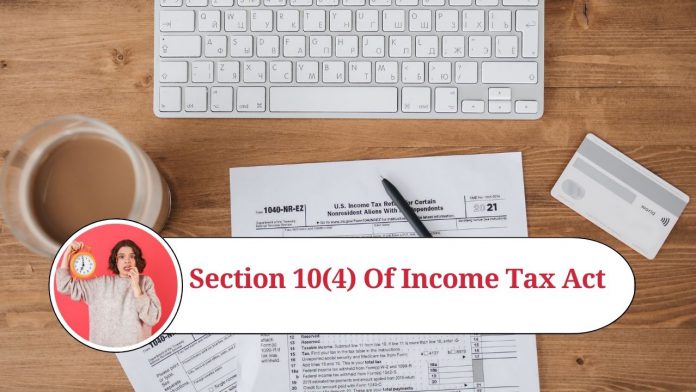The Income Tax Act provides various exemptions and deductions to taxpayers to reduce their tax liability. One such exemption is provided under Section 10(4) of the Income Tax Act, which deals with the exemption of agricultural income from tax. In this article, we will discuss the various aspects of Section 10(4) of the Income Tax Act.
Meaning of Agricultural Income
Agricultural income refers to any income derived from the agricultural operations carried out on land situated in India. Agricultural operations include:
- Cultivation of crops, plants, and vegetables.
- Dairy farming, breeding of livestock, and poultry farming.
- Production of seeds, saplings, and other similar products.
- Rent received for agricultural land.
However, agricultural income does not include income derived from any activity which is not an agricultural operation, such as the sale of agricultural products outside the country, processing of agricultural products beyond the initial stage, and income derived from the sale of wood obtained from trees grown on agricultural land.
Exemption under Section 10(4) of the Income Tax Act
Section 10(4) of the Income Tax Act provides that agricultural income is exempt from income tax. This means that if a person earns agricultural income, it will not be included in their total income to compute their income tax liability. Therefore, agricultural income is not subject to income tax.
However, it is important to note that the exemption under Section 10(4) of the Income Tax Act is available only to individuals and Hindu Undivided Families (HUFs) who have earned agricultural income. Other entities, such as companies, firms, and associations of persons, are not eligible for this exemption.
Clubbing of Agricultural Income
The Income Tax Act allows for the clubbing of income earned by a taxpayer’s spouse, minor child, or daughter-in-law. However, in the case of agricultural income, there are certain exceptions to this rule.
As per Section 10(4A) of the Income Tax Act, if an individual earns agricultural income and their spouse, minor child, or daughter-in-law has also earned agricultural income, then the two incomes will not be clubbed together. This means that each person’s agricultural income will be taxed separately, and the exemption under Section 10(4) of the Income Tax Act will be available to both individuals.
Taxation of Non-Agricultural Income
If a taxpayer earns both agricultural and non-agricultural income, then their non-agricultural income will be taxed as per the normal provisions of the Income Tax Act. The exemption under Section 10(4) of the Income Tax Act will be available only for the agricultural income earned by the taxpayer.
Maintenance of Proper Records
Taxpayers who earn agricultural income are required to maintain proper records of their income and expenditure related to agricultural operations. This includes details of the crops grown, the area of land under cultivation, the amount of seed, fertilizers, and other inputs used, and the revenue earned from the sale of agricultural produce.
The Income Tax Department may ask for these records to verify the claim of exemption under Section 10(4) of the Income Tax Act. Therefore, taxpayers need to maintain proper records of their agricultural income and operations.
Conclusion
In conclusion, Section 10(4) of the Income Tax Act provides an exemption for agricultural income earned by individuals and HUFs. The exemption is available only for income derived from agricultural operations carried out on land situated in India. Taxpayers who earn agricultural income are required to maintain proper records of their income and expenditure related to agricultural operations. While the exemption is a significant relief for farmers, it is important to note that any non-agricultural income earned by the taxpayer will be subject to regular income tax provisions.
Read more useful content:
- section 145 of income tax act
- section 10e of income tax act
- section 9 of the income tax act
- section 94b of income tax act
- section 206aa of income tax act
Frequently Asked Questions:
What is agricultural income?
Agricultural income refers to any income derived from agricultural operations carried out on land situated in India. It includes income from the cultivation of crops, dairy farming, breeding of livestock, and poultry farming.
Who is eligible for the exemption under Section 10(4)?
Individuals and Hindu Undivided Families (HUFs) who have earned agricultural income are eligible for the exemption under Section 10(4) of the Income Tax Act.
Are companies and firms eligible for the exemption under Section 10(4)?
No, companies, firms, and associations of persons are not eligible for the exemption under Section 10(4).
Is there a limit on the amount of agricultural income that can be exempted?
No, there is no limit on the amount of agricultural income that can be exempted under Section 10(4) of the Income Tax Act.
Can agricultural income be clubbed with the income of the taxpayer’s spouse or minor child?
In general, income earned by a taxpayer’s spouse or minor child is clubbed with the taxpayer’s income. However, in the case of agricultural income, if both the taxpayer and their spouse or minor child have earned agricultural income, the two incomes will not be clubbed together.
Is it necessary to maintain proper records of agricultural income?
Yes, taxpayers who earn agricultural income are required to maintain proper records of their income and expenditure related to agricultural operations. These records may be required by the Income Tax Department to verify the claim of exemption under Section 10(4) of the Income Tax Act.
Is non-agricultural income exempted under Section 10(4)?
No, only agricultural income is exempted under Section 10(4) of the Income Tax Act. Non-agricultural income is subject to regular income tax provisions.
Are there any penalties for not maintaining proper records of agricultural income?
Yes, taxpayers who fail to maintain proper records of their agricultural income and operations may be penalized by the Income Tax Department. It is important to ensure that all necessary records are maintained to avoid any disputes with the department.




















